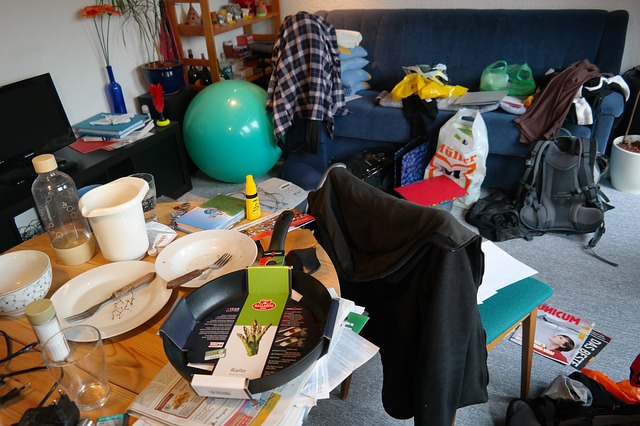Several years back while at uni, I was doing some work for a cleaning company to bring in a little extra money. The company specialised in, among other things, deceased estate clearance and clean-up and some of the tougher cleaning work that some commercial cleaning companies won’t touch.
While working cleaning jobs, I had to face some pretty intense clean-ups: places that had been intentionally trashed by angry tenants, places infested with squatters, drug dens, even crime scenes. But nothing prepared me for entering the home of a hoarder.
It was like nothing I’ve ever experienced and it was my last job with the company.
Entering a hoarder’s house
From the outside, it was an unassuming weatherboard cottage in Melbourne’s inner-western suburbs. Walking past, you wouldn’t give it a second look.
But stepping inside was like stepping into the shadowed recesses of a troubled mind. It was dark, with most of the windows papered over. The first thing that hit me was the smell. Thick and musty, a smell that was simultaneously wet and mouldy and dry and desiccated, a smell of something growing and something dying.
Each room was piled, sometimes to the ceiling, with a random assortment of junk, rubbish, food scraps, old clothes, broken furniture – it was like someone had transported a rubbish tip into this living room. Moisture had started climbing the towers of old newspapers and magazines, with those at the bottom rotting away into a mush that mixed in with the mouldering carpet fibres. Some rooms were only accessible via a single-file walkway between the towering trash. You couldn’t even get into one of the rooms as the entry was completely blocked by a wall of junk. There was almost no surface that wasn’t obscured by a seemingly random assortment of decaying garbage.
A bunch of questions ran through my mind: How can someone live like this? Like, practically, how could they function day to day? How did this person’s situation get this out of hand? How did this person interact with other people? Did they live a “normal” outside the house?
I’ve worked clean-ups of this scale before, but cleaning up this hoarder’s house was different. It felt personal, sad, almost haunted. As we collected and bagged the years of accumulated garbage, l could almost feel anguish coming from each item, like each object was part of some great psychological question that would never be answered, a symbol of this person’s tragic life.
For me, it was an awful, harrowing experience and one I didn’t want to repeat. I quit the cleaning gig as soon as that job was complete, but I’ve carried a morbid fascination with hoarding ever since.
What is hoarding?
To put it briefly, hoarding is a psychological disorder where people compulsively save and have difficulty parting with property, regardless of whether it has any use or value. The disorder can lead to dangerous amounts of clutter, extreme unsanitary conditions, and difficulties with socialising and relationships.
Hoarding affects about 2-6% of the population. It’s considered a subtype of obsessive-compulsive disorder (OCD) and often associated with other psychological disorders including:
- Depression
- Anxiety
- Personality disorders
- Addiction problems
- ADHD
- Post-traumatic stress disorder
Hoarders often have a tendency towards indecisiveness, perfectionism, avoidance, procrastination, and problems with planning and organisation.
Treating the issue can be difficult as people with hoarding disorders often don’t actually see it as a problem.

Why hoarding is a problem
The most obvious consequence of hoarding is the effect it has on the person’s living conditions. Living areas – including bedrooms, kitchens, and bathrooms – become cluttered and unusable. Areas quickly become unsanitary. As the heaps of junk accumulate, they create fire hazards, as well as the risk of collapse. In 2006, a 62-year-old woman suffocated in her home after a pile of hoarded debris collapsed on her. It took the police more than 10 hours to find her body.
Besides affecting a person’s living conditions, hoarding can have some far-reaching consequences that can significantly affect the sufferer’s life. Some issues include:
- Extreme stress and anxiety relating to everyday objects
- Health issues due to unsanitary conditions
- Withdrawing from friends, family, and society
- Distrust of others
- Relationship stress and breakups
- Loneliness and isolation
- Social shame
- Financial and legal issues such as eviction, damages, health violations
In some people, hoarding expresses itself through hoarding animals. Because of the large number of animals, the unsanitary conditions and the nature of the person’s disorder, these animals are usually poorly cared for. As a result, some case of hoarding has led to charges of animal cruelty.
What causes hoarding?
The exact causes of hoarding are unknown. Genetics, abnormal brain function and psychological trauma are all being studied as contributing factors.
Psychological researchers have suggested that hoarding is a stress response related to indecision and lack of control in life. For some people, decision-making can create significant anxiety and hoarding is a way to avoid that anxiety by simply holding on to everything and therefore not having to make any decisions. It provides a degree of perceived control and saves the person from the stress of making the potentially wrong decisions.
Hoarding is often associated with a traumatic loss or other life trauma. Beyond the psychological mechanisms, researchers also suspect there are genetic factors at work, as a significant number of hoarders have close relatives suffering from the same disorder.
When to call in help
If you have a friend or family member with a hoarding problem, contact a doctor or mental health professional. They will be able to provide help and advise you regarding the next steps. They can also direct you to helpful community, council or government groups.
Unfortunately, the most common contact most people have with hoarding is when a family member or loved one pass away. In such cases, cleaning the house can be an even more emotionally harrowing experience than mine was due to the intimate connection to the hoarder. In this case, I recommend not taking the work on yourself. Quality cleaning and deceased estate clearance companies offer hoarder cleaning services. They can handle the cleaning, rubbish disposal and even the home repairs and preparation for sale, giving you time to grieve and make the other necessary arrangements.

